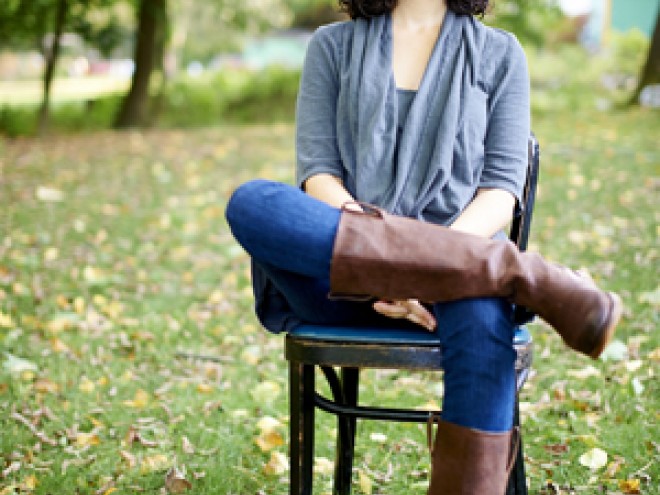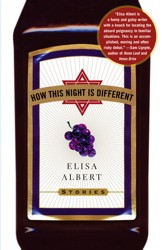Packed with hearty doses of wit and empathy, Elisa Albert’s debut novel tells the story of Dahlia Finger, a dissatisfied, out-of-work twenty-nine year-old, who lives in the Southern California condo her father purchased for her. Dahlia spends her days idly watching movies on cable TV, getting stoned, and daydreaming of one day applying to graduate school. Late one night, Dahlia unexpectedly suffers a grand mal seizure, and is subsequently diagnosed with an inoperable brain tumor.
What follows from this startling news is both a chronicle of Dahlia’s health crisis and the story of her coming-of-age, retrospectively told in seamlessly-constructed snapshots. Wounded familial relationships come to the fore, and Dahlia must confront her agreeable yet world-weary father, her hostile older brother, and her ever-distant mother. Rather than making peace and settling past feuds however, Dahlia remains sarcastic and headstrong, unwilling to adopt a saccharine personality. She grudgingly buys a self-help book that suggests she follow a cancer “to-do list.” From here, Albert’s novel works in dialogue with this all-too-cheerful book, as Dahlia refuses to be blindly optimistic in the face of her illness. A powerful meditation on mortality, Albert’s richly expressive novel possesses that rare quality of making life feel wholly real.
From the Rohr Judges
Meet Dahlia: hilarious, profane, drifting, thoughtful, angry, inoperable. The protagonist of Elisa Albert’s first novel has her life and her mind brought into sudden focus by the discovery of her aggressive brain tumor. But make no mistake: The Book of Dahlia isn’t a saccharine story of the nobility that comes with accepting fate gracefully. Instead, Dahlia’s own ragged, frustrating journey towards the end feels much more profoundly, if comically realized. Bringing her memories, her family, her lovers into the story, Albert renders Dahlia unforgettable by virtue of who she is, not what she’s done, in an indelible voice that lingers long after the novel’s final page.
Elisa Albert on The Book of Dahlia
A steady and constant writing life is the ultimate goal for me. Pushing forward and quite simply doing the work, day in and day out. It’s a huge challenge for me: I tend, quite honestly, toward rather dramatic bursts of productivity book-ended by periods of creative despondency and self-loathing. I feel like I’ve conquered the world and the worst in myself when I can just do the work, do the work, do the work, and let the chips fall where they may.
On the broadest level, and at its best, fiction can do miraculous things: show us bits and pieces of ourselves in stories with which we might not otherwise immediately identify, expand our capacity for real-life empathy by forcing us to empathize with characters we’ll never actually meet, and make us think about how vastly different perspectives on the world can form a really vibrant, if challenging, harmony.
Reading Group Guide
From: Simon and Schuster
Discussion Questions
1. What was your initial impression of Dahlia? Did your opinion change as the story progressed and significant details about her life experience were revealed? Why or why not?
2. What do you think about the idea that a positive attitude is the most important ingredient for a happy, healthy life? Why does Dahlia resist this theory, and what does it tell us about her? Do you think Dahlia’s attitude “dooms” her? Many of us have had experiences with cancer, either personally or in our families. In our experiences, how has this dictate to be “positive” affected us and our loved ones? Is there a part of us that wants to kick and scream and complain and feel sorry for ourselves, even though we know it’s not productive? Discuss your own experiences with illness. Does illness transform us? Why or why not?
3. “Sure, the situation was bad, but Dahlia felt free, freer than ever, to do what she did best: muck around in the heinous reality of it. She was unimpeachable. She could say and think and feel whatever she wanted. She had cancer! (p. 40)” On some level is Dahlia a little bit glad to have this terminal illness? Does she believe it lends weight and shape and meaning and confirmation to her enormous unhappiness?
4. Dahlia spends a lot of her time watching television, often viewing the same movies on cable over and over again. Why is watching familiar movies “a kind of prayer (p. 6)” for Dahlia?
5. Discuss Dahlia’s relationship with her brother, Danny. What compels her to pursue a relationship with him for so many years despite his thoughtless cruelty to her? What does her persistent devotion to and adoration for Danny tell us about her? Why, then, do you think Dahlia refuses to forgive Danny even on her deathbed?
6. “A vile, self-absorbed, depressing, lazy, messy, spoiled, f — ed-up, probably mentally ill loser dies. So what?” muses The Book of Dahlia (p. 252). How would you answer one of the novel’s central questions: Is a seemingly “wasted” life worth mourning?
7. If you found her difficult to like in general, are there nevertheless things about Dahlia that you do find sympathetic? Can you think of some emotional or psychological ways in which Dahlia does indeed triumph? When we encounter a character with whom we don’t totally identify, what can we learn about ourselves from our reactions?
8. What do you think is useful about art (literature, music, film, painting, photography) that is “depressing” or full of angst and pain? What do you gain from looking at or reading or watching or listening to a work of art that is sad or unpleasant as opposed to cheerful and uplifting? Do you think we can learn from “depressing” art, or should we want to see only happy things?
9. What do you think the narrator means in calling Dahlia’s story a “litmus test (p. 252)”? Do you think you passed or failed this test and why?
10. If Dahlia made you feel judgmental or unsympathetic, discuss how and why you dislike her. In what ways does a character like Dahlia make us confront our own fears and regrets? What role has resentment played in your own life, and how have you conquered it or struggled to conquer it? Discuss a time in your life when you were bogged down in negative emotions, and talk about how you got through it.
11. Given the choice to wallow in self-pity and anger and resentment or take charge of our lives and let go of the past, how and why are we sometimes able to choose the latter? What makes a person strong enough to “Choose Life” versus someone who is unable to do so?
12. How do you think our society as a whole deals with death? Are you satisfied or dissatisfied with the cultural and religious ideas about death that you’ve encountered? What are your own attitudes about and notions of death? How have these changed throughout your life? Is it something you think about often? Why or why not?
Enhance Your Book Club
1. Elisa Albert has said that Leo Tolstoy’s novella The Death of Ivan Ilyich and Susan Sontag’s essay “Illness as Metaphor” served as inspirations for The Book of Dahlia. Read those works and discuss thematic overlaps.
2. Read Albert’s short story collection, How This Night Is Different, and discuss its similarities to and differences from The Book of Dahlia.
3. Learn more about the author by visiting her website www.elisaalbert.com, where you can find interviews, profiles, and reviews of The Book of Dahlia and How This Night Is Different.
4. Listen to Albert’s interview with Scott Simon on NPR’s Weekend Edition at http://www.npr.org/templates/story/story.php?storyId=90157329.
5. Listen to Albert’s podcast interview with Nextbook editor Ellen Umansky at http://www.nextbook.org/cultural/feature.html?id=795.





